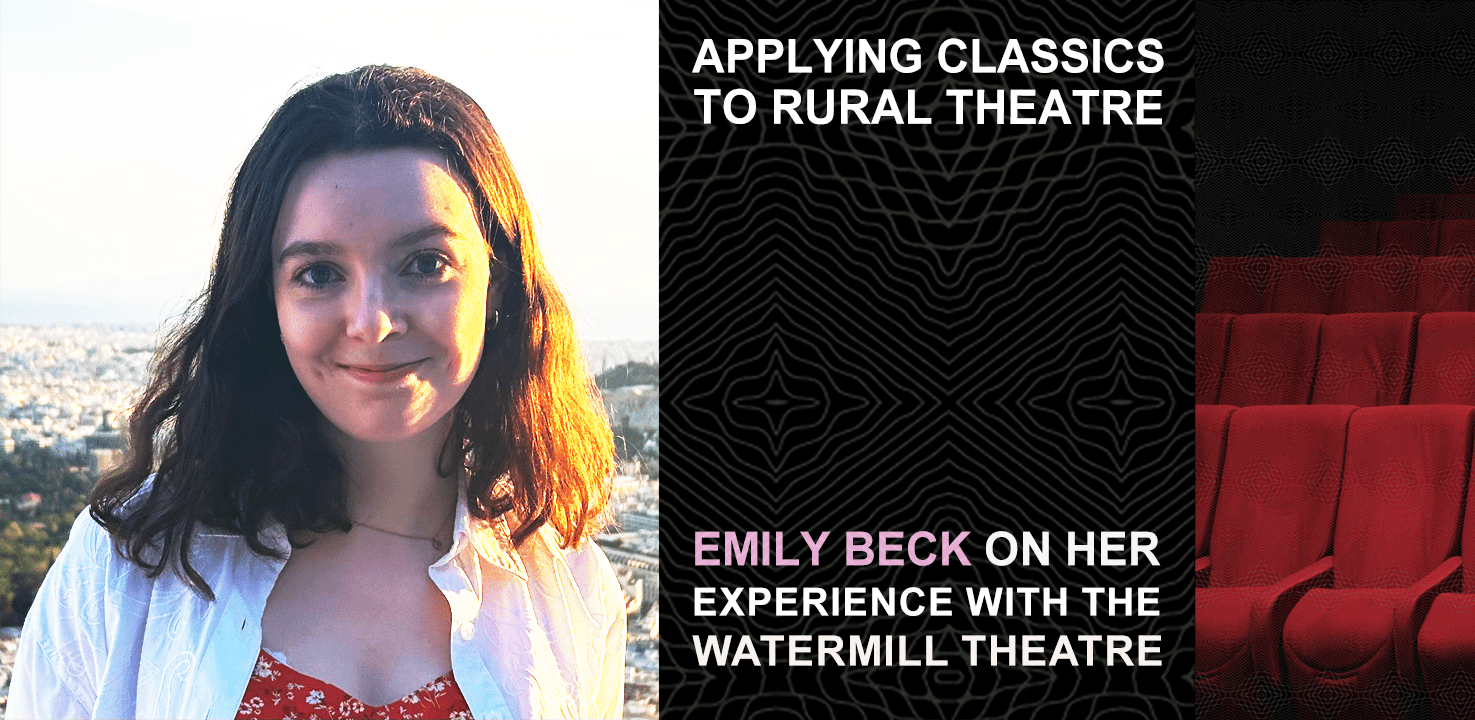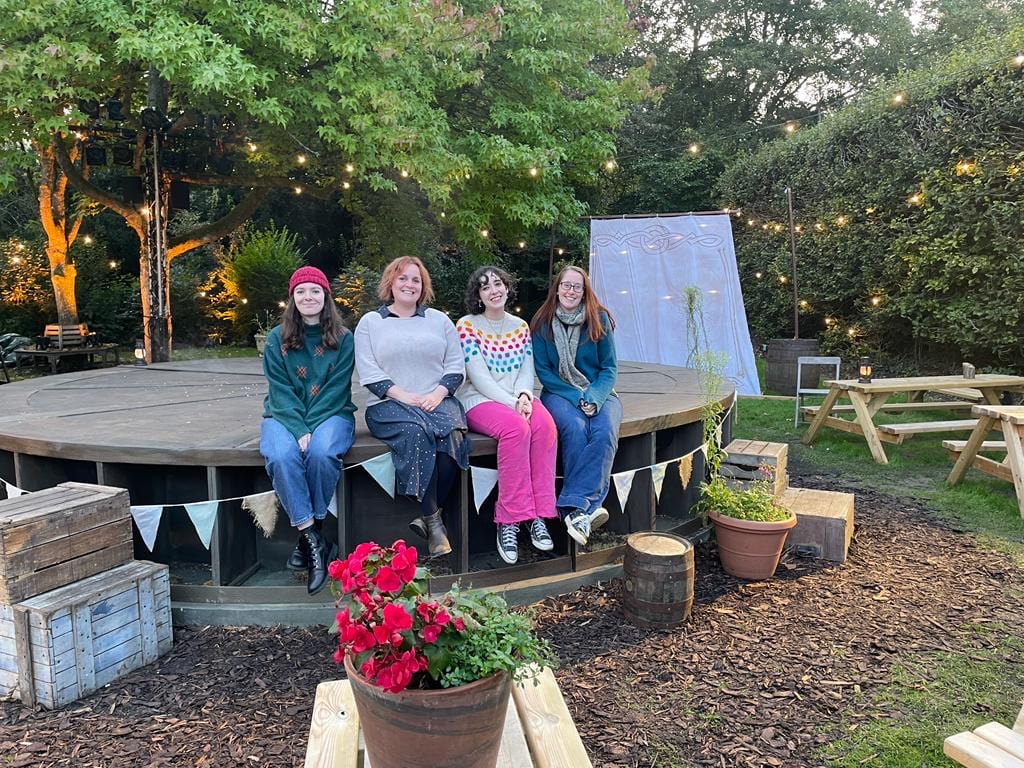 Emily Beck has been a Theatre Administrator at The Watermill Theatre since she graduated in 2022. She discusses what her job involves, far more than just admin, and how she got there
Emily Beck has been a Theatre Administrator at The Watermill Theatre since she graduated in 2022. She discusses what her job involves, far more than just admin, and how she got there
The title – Theatre Administrator – sums up what the role involves fairly well by combining the very specific theatre industry within the arts and heritage sector with more general administrative. On any given day, I could be coordinating tickets and gifts for press night (the official opening of a show, to which reviewers are invited), finding accommodation for a new cast arriving to start rehearsals, or setting up a Q&A event with a director for the theatre’s Friends members, alongside standard administrative tasks such as answering general enquiries via phone and email, scheduling and minuting meetings and ensuring all office and health and safety supplies are up to date.
Every member of the team has to pull their weight
Really, though, the specific nature of The Watermill Theatre makes my role significantly different from admin in another sector. The Watermill is a small, rural theatre in West Berkshire that is very ambitious in the shows it stages – from humble beginnings in our Grade II listed theatre, productions frequently tour the UK or transfer to the West End. We are a charity with a small permanent staff team, so this creative ambition (in addition to a recent 100% Arts Council funding cut) really means every member of the team has to pull their weight. For me, this looks like my role expanding into areas such as HR (I advertise and process applications for all vacancies), Executive support (I assist the Executive Director and prepare papers for and minute Board meetings) and events organisation (I’m currently coordinating 28 local stallholders for this year’s Christmas Fair). I was also recently tasked with covering social media for a month while a Marketing vacancy hadn’t yet been filled, and because of my previous experience within the organisation I often cover the Casting Assistant’s duties when she’s on leave.

It’s really important to consider the size of the organisation and the way different departments interact, and whether this matches the sort of working environment you prefer.
I enjoy these additional challenges as they give me a greater level of responsibility and creativity, and it also means I can interact with a range of different colleagues across different departments, who I’ve learned a lot from already. I prefer a collaborative, flexible style of working, though – when exploring whether a role might suit you, it’s really important to consider the size of the organisation and the way different departments interact, and whether this matches the sort of working environment you prefer.
When people ask what I did before The Watermill, they’re often surprised to hear I’ve got a degree in Classics. For me, the skills I learned from my degree were surprisingly people-focused considering the amount of time spent working with dead languages – Classics is all about unpicking the narratives, beliefs, arguments and biases of a range of different sources, both textual and material, in order to further your understanding of ancient cultures and how they relate to the present. This has served me well in the elements of my job that involve customer service and copywriting, which are all about understanding other peoples’ perspectives and knowing how to best target your audience, and of course the time management skills I developed from four years of independent study have been incredibly helpful in enabling me to balance all the various responsibilities that sit with my role.
At Cambridge my degree, as well as extracurricular activities such as a position on the committee of CUADC (one of the main theatre societies at Cambridge) and a job as a Telethon Caller that boosted my confidence on the phone, certainly contributed to my ability to make a strong application. The real reason I got the job though, goes back to the specific nature of The Watermill as a theatre, a charity and a workplace. This theatre has been part of my life for a long time; I attended shows regularly with my family, was part of the Associate Youth Theatre as a teenager and was offered my first paid job assisting with Outreach courses for young children after completing their Work Experience programme. Later, when The Watermill (like many theatres) was hit hard by the pandemic, I emailed in my CV to the Outreach Director, who ran the Work Experience programme, and offered to support the team in any way I could. While this speculative application didn’t pay off immediately, the following summer I was offered a fixed-term position when the Outreach Director and her colleague the Casting Assistant were both looking for some extra support and remembered my email (so if you’re thinking about sending a speculative application, do it!). Having particularly enjoyed and got to grips with the casting side of things, I was invited back to help cast a second production over 4 weeks during my Christmas vacation.
For arts organisations, it’s particularly useful to understand the more practical, business side of things as well as their more glamorous artistic output
By the time I applied and was interviewed for my current role, I was able to demonstrate both a passion for the theatre’s artistic mission and an understanding of it as a workplace. It didn’t hurt, either, that I could cite my experience over Christmas completing my second Casting Assistant job while writing my dissertation, when asked about time management at interview. This understanding of the specific nature of your employer is not necessarily something you need to gain over a long period of time the way I did – you can develop knowledge by keeping up-to-date with a company’s website and social media pages, for example, or contact their employees on LinkedIn. For arts organisations, it’s particularly useful to understand the more practical, business side of things as well as their more glamorous artistic output, as much to help you know whether this is the job for you as to give you something concrete to say at interview.
Don’t be worried about asking questions of or for accommodations from a potential employer
And one last thing: I was nervous whether my application for the Theatre Administrator job would be considered seriously because I was upfront at my interview (March) that I wouldn’t be able to start until after I graduated (July). My boss, thankfully, was happy to wait for me to be available, and offered me the position. So don’t be worried about asking questions of or for accommodations from a potential employer – as a new graduate, it’s important to find the right role for you and the employers’ answers to any questions can tell you a lot. This early interaction with my boss about my start date demonstrated to me that The Watermill was a workplace within which I would feel valued, and this remains true nearly a year and a half later.
